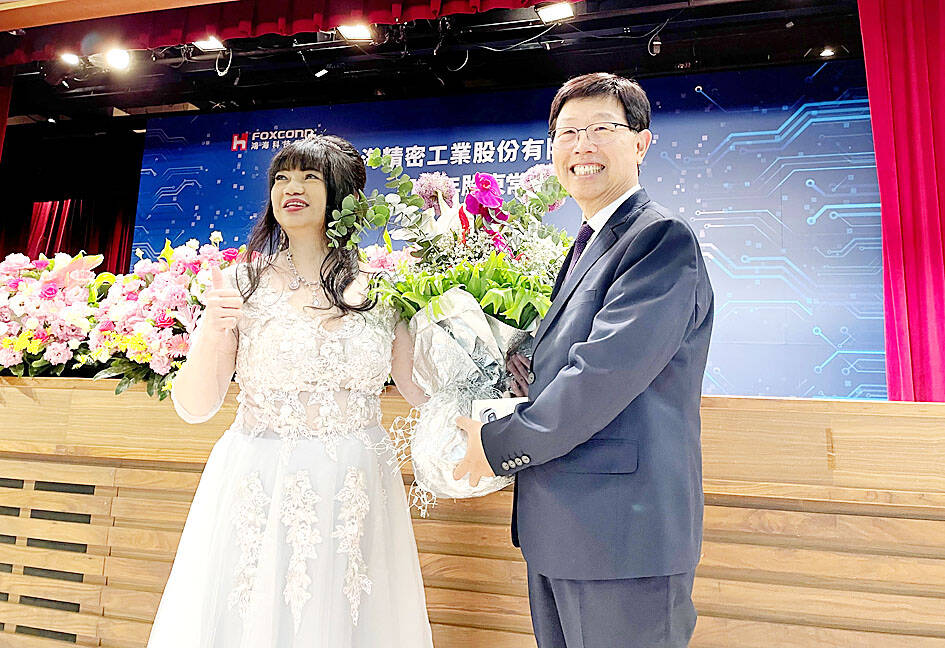Hon Hai Precision Industry Co (鴻海精密) predicts three-digit percentage growth for its artificial intelligence (AI) server business due to robust demand for AI products such as ChatGPT, chairman Young Liu (劉揚偉) said yesterday.
Hon Hai — known globally as Foxconn Technology Group (富士康科技集團) — is the world’s biggest contract electronics manufacturer and assembles devices for many international brands, most notably Apple Inc’s iPhone products.
It has also moved to diversify beyond electronics assembly, expanding into areas ranging from electric vehicles to semiconductors and servers.

Photo: CNA
“In 2022 alone, Hon Hai’s revenue for servers reached NT$1.1 trillion [US$35.75 billion] to obtain a 40 percent global market share,” Liu told an annual shareholders’ meeting in Taipei.
AI servers made up about 20 percent of the company's total server sales last year, Liu said, adding that Hon Hai had taken advantage of solutions provided by Intel Corp, Advanced Micro Devices Inc and ARM Ltd to roll out AI servers.
Hon Hai ranks first in global market share for mobile phones, PCs and servers, with the AI server market now “rising faster than everyone has expected,” Liu said.
He attributed the jump in demand to ChatGPT, the AI program that burst into the spotlight late last year with the ability to generate essays, poems and conversations from the briefest of prompts. Its runaway success has sparked a gold rush with billions of dollars of investment in the field.
“For the second half of this year, we may have three-digit growth, not two digits... We will continue to boost our market share for servers,” Liu said.
He said the company’s latest AI servers also use Nvidia Corp chips.
Nvidia is known for creating graphics chips long coveted by gamers, but which have become engines for the kind of complex processes involved in AI, known as accelerated computing.
Nvidia, cofounded by Taiwanese-American Jensen Huang (黃仁勳), surged to a market value of more than US$1 trillion on Tuesday after its quarterly earnings report last week blew past expectations.
Despite the rosy future for AI, Hon Hai maintains a “flat” outlook for this year, Liu said, after its first-quarter profit plunged 56 percent on weakened demand due to a global downturn.
“The global tightening monetary [policies], coupled with tense geopolitics and the significant uncertainty of inflation have a relatively large impact on the economic outlook,” he said.
Meanwhile, Hon Hai has started trial production of a third-generation silicon carbide (SiC) semiconductor for use in electric vehicles for five clients, Liu said, adding that a 6-inch SiC wafer plant in Hsinchu acquired from Macronix International Co (旺宏電子) in 2021 has begun commercial production.
According to Hon Young Semiconductor Corp (鴻揚半導體), a Hon Hai subsidiary, the Hsinchu plant will be upgraded to an 8-inch wafer plant by 2025 with an ultimate annual production capacity of up to 200,000 units.
At the meeting, Hon Hai shareholders approved a proposal to issue NT$5.3 in cash dividend per share based on the company's earnings per share of NT$10.21 last year.
The cash dividend, the highest since the company launched an initial public offering in 1991, represents a payout ratio of 52 percent and is the fourth consecutive year Hon Hai has maintained a payout ratio above 50 percent.
Additional reporting by CNA

SECURITY: As China is ‘reshaping’ Hong Kong’s population, Taiwan must raise the eligibility threshold for applications from Hong Kongers, Chiu Chui-cheng said When Hong Kong and Macau citizens apply for residency in Taiwan, it would be under a new category that includes a “national security observation period,” Mainland Affairs Council (MAC) Minister Chiu Chui-cheng (邱垂正) said yesterday. President William Lai (賴清德) on March 13 announced 17 strategies to counter China’s aggression toward Taiwan, including incorporating national security considerations into the review process for residency applications from Hong Kong and Macau citizens. The situation in Hong Kong is constantly changing, Chiu said to media yesterday on the sidelines of the Taipei Technology Run hosted by the Taipei Neihu Technology Park Development Association. With

A US Marine Corps regiment equipped with Naval Strike Missiles (NSM) is set to participate in the upcoming Balikatan 25 exercise in the Luzon Strait, marking the system’s first-ever deployment in the Philippines. US and Philippine officials have separately confirmed that the Navy Marine Expeditionary Ship Interdiction System (NMESIS) — the mobile launch platform for the Naval Strike Missile — would take part in the joint exercise. The missiles are being deployed to “a strategic first island chain chokepoint” in the waters between Taiwan proper and the Philippines, US-based Naval News reported. “The Luzon Strait and Bashi Channel represent a critical access

CARROT AND STICK: While unrelenting in its military threats, China attracted nearly 40,000 Taiwanese to over 400 business events last year Nearly 40,000 Taiwanese last year joined industry events in China, such as conferences and trade fairs, supported by the Chinese government, a study showed yesterday, as Beijing ramps up a charm offensive toward Taipei alongside military pressure. China has long taken a carrot-and-stick approach to Taiwan, threatening it with the prospect of military action while reaching out to those it believes are amenable to Beijing’s point of view. Taiwanese security officials are wary of what they see as Beijing’s influence campaigns to sway public opinion after Taipei and Beijing gradually resumed travel links halted by the COVID-19 pandemic, but the scale of

Pope Francis is be laid to rest on Saturday after lying in state for three days in St Peter’s Basilica, where the faithful are expected to flock to pay their respects to history’s first Latin American pontiff. The cardinals met yesterday in the Vatican’s synod hall to chart the next steps before a conclave begins to choose Francis’ successor, as condolences poured in from around the world. According to current norms, the conclave must begin between May 5 and 10. The cardinals set the funeral for Saturday at 10am in St Peter’s Square, to be celebrated by the dean of the College